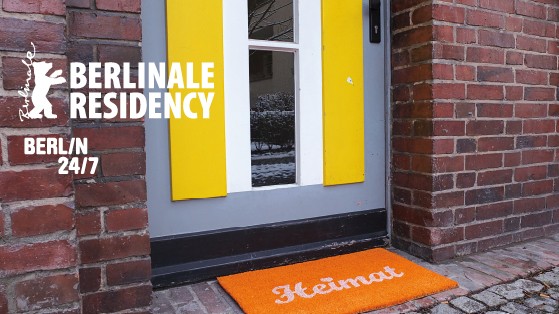2014 | Berlinale Residency
Berlinale Residency 2013 / 2014
The Berlinale Residency programme supported writer/directors from around the world, who had already enjoyed their first festival and cinema successes, in developing their new fiction, documentary film or cross-media projects. Only feature-length projects to which a producer was officially attached were eligible for selection.

The Berlinale Residency offered the filmmakers a great working atmosphere, monthly sessions with renowned script mentors and social events with fellow filmmakers. Their producers received input from widely experienced industry professionals and support in preparing and packaging the selected projects for the international market in a workshop towards the end of the Residency programme. The filmmakers and their producers returned to Berlin in February for the Berlinale Co-Production Market where they presented their project to potential co-producers and financiers.
In 2013 / 2014, the Berlinale Residency gave six filmmakers the opportunity to maximize the potential of their projects and to find their audiences, without limiting the creative qualities of the stories they want to tell. The writer/directors received three monthly grants of 1.500 Euro each, enabling them to live and work in Berlin for the duration of the programme.
Participants and Projects 2013 / 2014
In 2013, an international jury – consisting of Clare Binns (Director of Programming and Acquisitions at City Screen, Great Britain), producer Cedomir Kolar (Asap Film, France) and Thomas Hailer (Berlinale Curator, Germany) - chose six directors and their projects:

(t.f.l.t.r.) Emir Baigazin, Bence Fliegauf, Alistair Banks Griffin, (b.f.l.t.r.) Sebastián Lelio, Elina Psykou, José Luis Valle
Emir Baigazin, Kazakhstan: The Wounded Angel
Producers: Beibit Muslimov and Anna Wilhelmi, Kazakhfilm Studios, Kazakhstan; Augenschein Filmproduktion, Germany; Capricci Films, France.
Born in Kazakhstan in 1984, Emir Baigazin studied film and television directing at the Kazakh National Academy of Arts. In 2007 he participated in the Asian Film Academy in Busan. He is also an alumnus of the 2008 Berlinale Talent Campus. Baigazin’s debut feature film, Harmony Lessons, was supported by the World Cinema Fund and celebrated its premiere in the Berlinale Competition 2013, where it won a Silver Bear for an Outstanding Artistic Contribution. The film was considered an extraordinary discovery and is now travelling the international festival circuit. The Wounded Angel, developed in the Berlinale Residency, premiered in Berlinale Panorama 2016.
Bence Fliegauf, Hungary: House of Isaura
Producer: Bence Fliegauf and Ernő Mesterházy, Fraktál Film, Hungary
Hungarian filmmaker Bence Fliegauf’s debut feature film Forest premiered in the Berlinale Forum in 2003. One year later, Dealer (2004) garnered him over 20 awards, including the FIPRESCI Prize at the Mar del Plata Film Festival. He won the Golden Leopard at the Locarno Film Festival for Milky Way in 2007. His first English-language movie, Womb, was screened in Locarno and Toronto. The Berlinale Competition 2012 presented Fliegauf’s latest film, Just the Wind, which received the Jury Grand Prix and went on to be screened at many other film festivals.
Alistair Banks Griffin, USA: Oyster (working title)
Producer: Eric Overmyer, USA
Alistair Banks Griffin was born in 1978 in England and raised in New Orleans. He received his BA from the Rhode Island School of Design. Griffin’s short film Gauge (2008) premiered at the New York Film Festival. In 2009 he was the recipient of a Cinereach grant for his first feature film, Two Gates of Sleep, which premiered at the 2010 Cannes Film Festival and then won the New Talent Grand PIX Award at CPH:PIX in Copenhagen in 2011. The film has screened at numerous international festivals and museums.
Sebastián Lelio, Chile: A Fantastic Woman
Producer: Juan de Dios Larraín, Fábula, Chile; Komplizenfilm, Germany; Participant Media, USA.
Born in Chile in 1974, Sebastián Lelio graduated from the Escuela de Cine de Chile. In 2006, he completed his first film, La Sagrada Familia, which received many awards and international recognition. His second film, Navidad, made its debut at the Cannes Film Festival in 2009. El Año del Tigre, his third feature film, was released in the international competition of the Locarno Film Festival in 2011. His latest film, Gloria, premiered in the Competition of the Berlinale in 2013, where it was highly acclaimed by the critics and the audience, and took home a Silver Bear for Best Actress. A Fantastic Woman, developed in the Berlinale Residency, premiered in Berlinale Competition 2017 where it was awarded the Silver Bear for Best Script, and won the Academy Award as Best Foreign Language Film 2018.
Elina Psykou, Greece: Son of Sofia
Producers: Giorgos Karnavas, Heretic, Greece; Kinoelektron, France.
Born in 1977 in Greece, Elina Psykou studied film directing at the Lykourgos Stavrakos Film School and sociology at Panteion University, both in Athens. She went on to study cultural history at the École des hautes études en sciences sociales in Paris. In 2007 she participated in the Berlinale Talent Campus. She has written and directed two short films, Sunday Trip (2004) and Summer Holidays (2006). Psykou’s first fictional feature film, The Eternal Return of Antonis Paraskevas, won the Best Work in Progress award at the Karlovy Vary International Film Festival; the film had its world premiere in the Berlinale Forum in 2013. Son of Sofia, developed in the Berlinale Residency, premiered in 2017 Tribeca where it won the Best International Narrative Feature Award.
José Luis Valle, Mexico: Operation Baby
Producer: José Luis Valle, Caverna Cine, Mexico
Born in El Salvador, José Luis Valle became a citizen of Mexico, where he studied literature and film. His short film Chimera won the Kodak Film School Competition and received an Honorary Mention at the Guadalajara International Film Festival in 2006. His documentary The Pope’s Miracle screened at the Locarno Film Festival in 2009. Valle’s first fictional feature, Workers, received support from the World Cinema Fund, premiered in the Berlinale Panorama in 2013, and won the Mezcal Prize for the best Mexican entry at the 28th Guadalajara International Film Festival.
The Berlinale Residency was an initiative of the Berlin International Film Festival, supported by Medienboard Berlin-Brandenburg and the Federal Foreign Office.